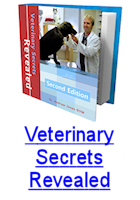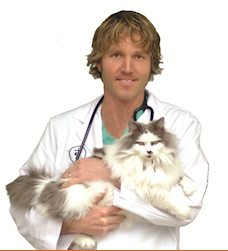|
Hi Friend,
Ringworm...
It is difficult to treat, and of BIG concern to me are the toxicity of the treatments.
I have seen cats become seriously sick, and nearly die being on one of the primary conventional medications, Griseofulvicin.
You need to be aware of the potential toxicity of "traditional" medication and be aware of the alternatives.
-------------------------------------
What is it?
-------------------------------------
Ringworm is a contagious fungal infection of the skin, caused by Microsporum canis.
It is not caused by a worm.
It is spread from person to person, from animal to person, or indirectly from contaminated objects.
Ringworm infects three sites: scalp, body and nails.
Ringworm is typically seen in young dogs and cats.
Diseases or medications that suppress the immune system generally make your pet more susceptible to ringworm.
Typical lesions are circular areas of hair loss (alopecia) on the hair coat; however, any change in the hair coat and/or skin may be consistent with ringworm.
The affected skin often appears scaly and inflamed.
Some pets suffer from severe skin disease while others have minor lesions, or even none at all.
What to Watch For
Circular areas of hair loss (alopecia)
Scaly and inflamed skin
--------------------
Diagnosis
--------------------
Ringworm often looks similar to other skin diseases, so it is difficult to diagnose based on skin appearance alone. Your veterinarian will run diagnostic tests to confirm the presence of the fungus. Some of these test may include:
Laboratory tests to include a complete blood count, biochemical profile, and urinalysis if immune suppression is a suspected underlying cause of the ringworm
A fungal culture to provide positive identification
Woods lamp examination. If the area fluoresces under the light, ringworm is suspected. However, culture is still strongly recommended. A negative fluorescence does not rule out ringworm, as several species of the ringworm do not fluoresce.
Microscopic examination of hairs
---------------------------
Treatment
---------------------------
The treatment for ringworm can be both frustrating and expensive, especially in a multi-pet household.
Treating both your pet and the environment are of equal importance.
Many pets will resolve an infection spontaneously over several months, but treatment generally expedites cure and helps reduce environmental contamination.
Nevertheless, some infections can persist.
TOPICAL ANTISEPTIC SCRUBS. Hibitane (chlorhexadine) is a very effective topical antiseptic useful in cleaning the affected area. Purchase it at any pharmacy. Wash the area twice daily.
NEEM. This is a herb called Azadirachta indica, with antifungal and antiseptic qualities. The tincture of the herb can be applied topically twice daily to speed up healing.
CALENDULA and ALOE VERA. These two herbs are both effective at giving symptomatic relief to inflamed skin. Either the tincture or a cream can be applied twice daily.
VINEGAR. Although it smells bad, it is an effective antifungal treatment. Wipe the affected area twice daily.
P.S. The NEW Vet Secrets is NOW on for 50% OFF
Get the newly updated 500 page version of Veterinary Secrets Revealed in
e-Reader format - for your iPad/iPhone, Kindle, Nook, Sony, Kobo or other
e-Reader - half price for 1 week.
After next week, book will be available on Amazon.com for $67.
Half off here:
http://www.veterinarysecretsrevealed.com/ebook/sale
Heal Your Pets At Home!
Best Wishes,
Dr Andrew Jones

DISCLAIMER: This information is for educational purposes only and is not intended to replace the advice of your own veterinarian. Dr Andrew Jones resigned from the College of Veterinarians of B.C. effective December 1 2010, meaning he cannot answer specific questions about your pet's medical issues or make specific medical recommendations for your pet.
PRIVACY POLICY: We will never rent, sell, loan, provide, barter, exchange or in any way make available your personal information to others. You can unsubscribe or change your email address at any time using the links at the bottom of this email.
Copyright 2012 Four Paws Online Ltd.
Tel: 1-800-396-1534
Fax: 1-888-398-1378
www.theonlinevet.com
support@fourpawsonlineltd.com
|